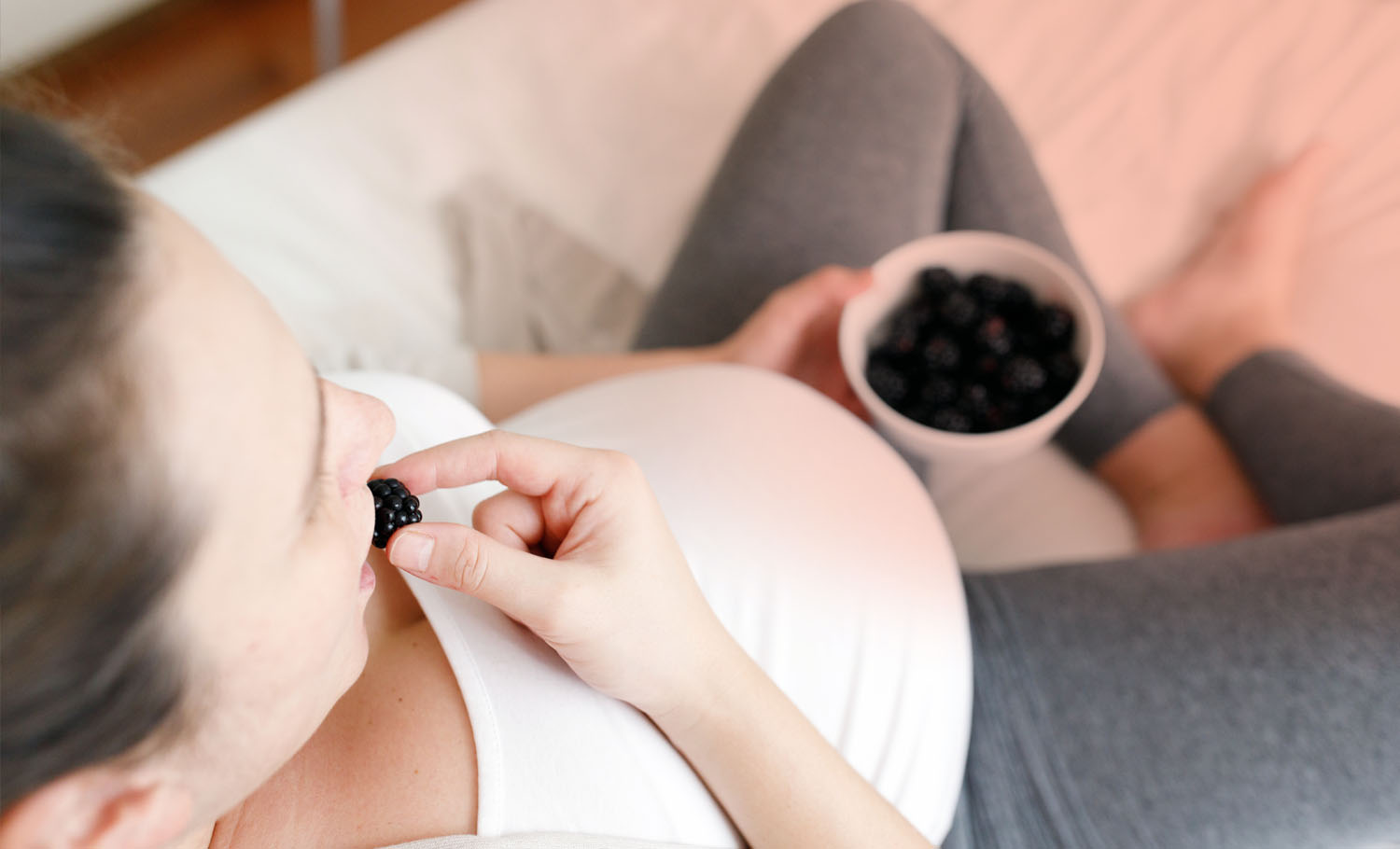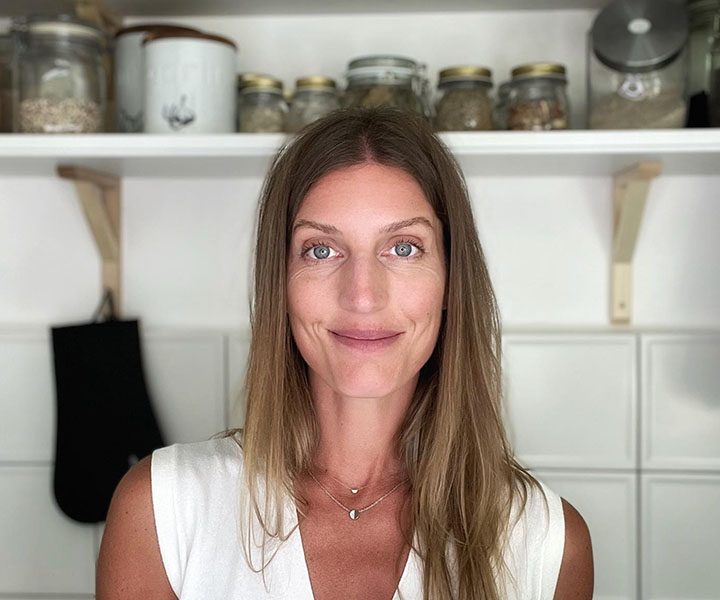Five recommendations for a better diet during pregnancy
22 November 2023 | Comment(s) |
Christelle Travelletti

Pregnancy is a total upheaval for a woman's body and the nutritional needs of a foetus have an impact on its future health. That’s why we have taken a look at diet during pregnancy with the nutritionist Aurelia Corbaz. As well as the basic recommendations on raw foods, alcohol and smoking, and taking folic acid, read on to discover how to look after the health of baby and mother.
1) Eating for two is a myth

Aurelia Corbaz: In fact, throughout pregnancy, you should be eating better and not eating for two. Why? Because the mother's metabolism increases throughout pregnancy. From the 150 extra calories per day that mothers burn, this rises to 300 extra calories per day in the third trimester. It's obvious that in terms of energy, we would need to increase energy intake in terms of quality (nutrients) and not quantity (calories).
It's important to remember that the better the quality of your diet during pregnancy, the more immunity your baby will have. Obviously, the more varied the diet in terms of vitamins, minerals, anti-oxidants and fibre, the better the conditions for immunity and healthy development. A healthy diet will also be beneficial for a smooth pregnancy and for the mother’s health.
- But what is a poor diet during pregnancy? This mainly involves foods that are too sweet. In other words, sugary drinks, sweets, ice creams, industrial biscuits and so on. It also includes industrial products and trans-fatty acids. Like crisps, fast food etc. and, of course, alcohol, too much caffeine and smoking. Of course, this over-consumption of processed foods can lead to gestational diabetes in the mother and type 2 diabetes in the child. It can also lead to the risk of pre-eclampsia, which is more likely to affect the mother, metabolic syndromes, hypertension and obesity. On the other hand, a mother who fails to eat enough during pregnancy will also increase her child's risk of type 2 diabetes and hypertension.
2) Nutritional needs change through each trimester
It is essential to take folic acid or vitamin B9 as a dietary supplement throughout pregnancy, as it plays a role in the formation of the child's neural tube. It is just as important to have sufficient levels of vitamin B9 before becoming pregnant.
Throughout pregnancy, I also recommend having sufficient levels of vitamin D, which plays a role in immunity and hormonal balance. The same goes for vitamin A (found in butter, for example), which plays a role in the child's night vision. And in terms of minerals, iodine (found in all fish and seaweed) is essential for the hormonal functions of both mother and child. Not forgetting magnesium, which acts on more than 300 functions in the body and helps you relax. It is therefore very useful in the event of pregnancy-related cramps.
In the first trimester, it's important to get enough iron (essential for oxygen transfer) and vitamin C, in addition to all the other nutrients. In the second trimester, in addition to all these nutrients, it's important to make sure you get enough calcium and protein, and in the third trimester, again in addition, it's important to get enough fatty acids, especially omega-3s, which are essential for the brain development of both the baby and the mother, thus avoiding the risk of postpartum depression.
- Any advice on preventing nausea (which is very common in the 1st trimester)?
First of all, try taking ginger, either as an herbal tea or to chew. Or eat small salted crackers. Note that nausea is mainly due to an empty stomach. This does not mean that you should eat all the time, but rather that you should either drink or avoid meals that are too fatty, which will be too hard on the digestion and make you want to vomit.

3) Staying hydrated is essential
It's vital to stay hydrated throughout your pregnancy, drinking between 1.5 and 2.5 litres a day. Hydration is essential for the development of the baby and for the transfer of nutrients. Drinking enough water also helps to prevent water retention in the mother.
- The importance of the microbiota for the baby's immunity: The mother's intestinal flora or microbiota affects the baby's immunity. It is therefore important to look after it before, during and after pregnancy. The microbiota is made up of billions of bacteria, and it is the good bacteria that will define the baby's immunity and thus potentially exclude allergies, eczema, etc. To have a healthy microbiota, you need to eat plenty of fibre (fruit and vegetables, legumes and wholegrain cereals). These fibres are prebiotics, in other words treats for the good bacteria in your intestinal flora. On the other hand, I advise against taking antibiotics, which will destroy the good bacteria and encourage the development of bad bacteria.
4) Omega-3 to prevent post-partum depression
Post-partum depression is becoming more and more common (we're also talking about it a lot more) and it's important to understand that there is a physiological reason for this state. So don't feel guilty about it! When you give birth to your baby, you give away everything you have in terms of omega 3s and nutrients, for example, so you have nothing left for yourself, especially to support your own brain function.
Omega-3s are brain food. So it's vital to continue consuming omega-3s, by eating oily fish (sardines, mackerel, salmon), nuts and cold-pressed vegetable oils (walnut oil, camelina oil, linseed oil, etc.) for example, and by continuing to take your special pregnancy food supplements, which should theoretically be rich in omega-3 DHA EPA fatty acids, but also in iodine, iron, vitamins B9 and B12, etc. It is also essential to cover all these nutrients after your pregnancy.

5) Don't forget to treat yourself!
The most important thing to remember is not to eat raw animal protein: eggs, cheese, meat, fish, milk, etc. Raw animal proteins are dangerous for you and your baby, as they can transmit bacterial diseases (Salmonella and Listeria).
It's also very good to eat good fats, plenty of protein and fruit and vegetables for fibre. But it's also very important to indulge yourself with little deviations from your healthy diet, such as chocolate cravings, which will create a balance that's very good for you.





